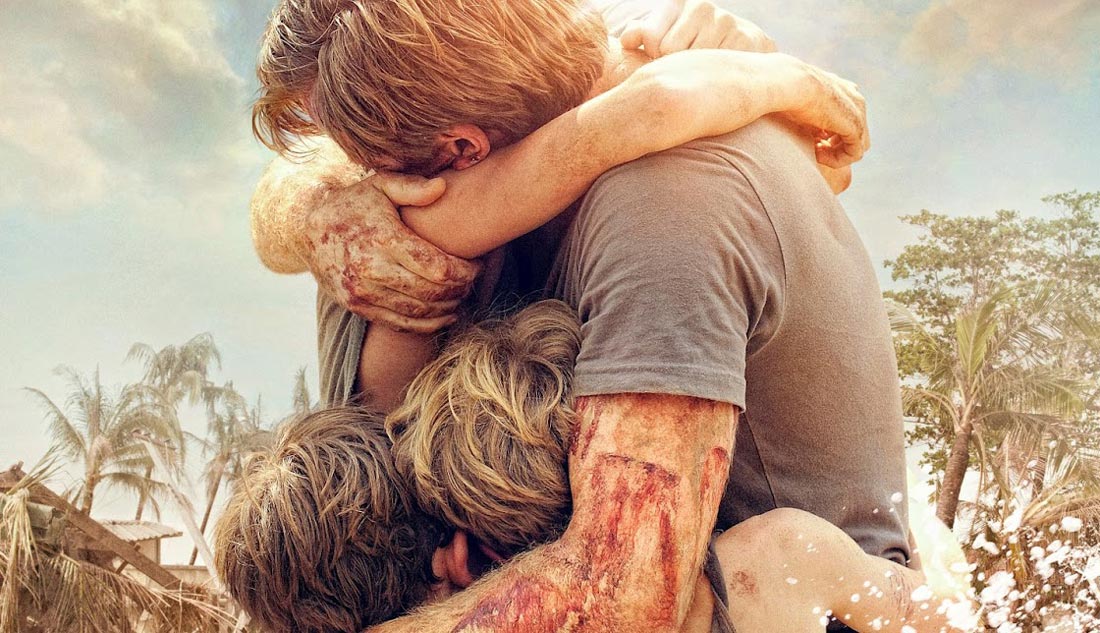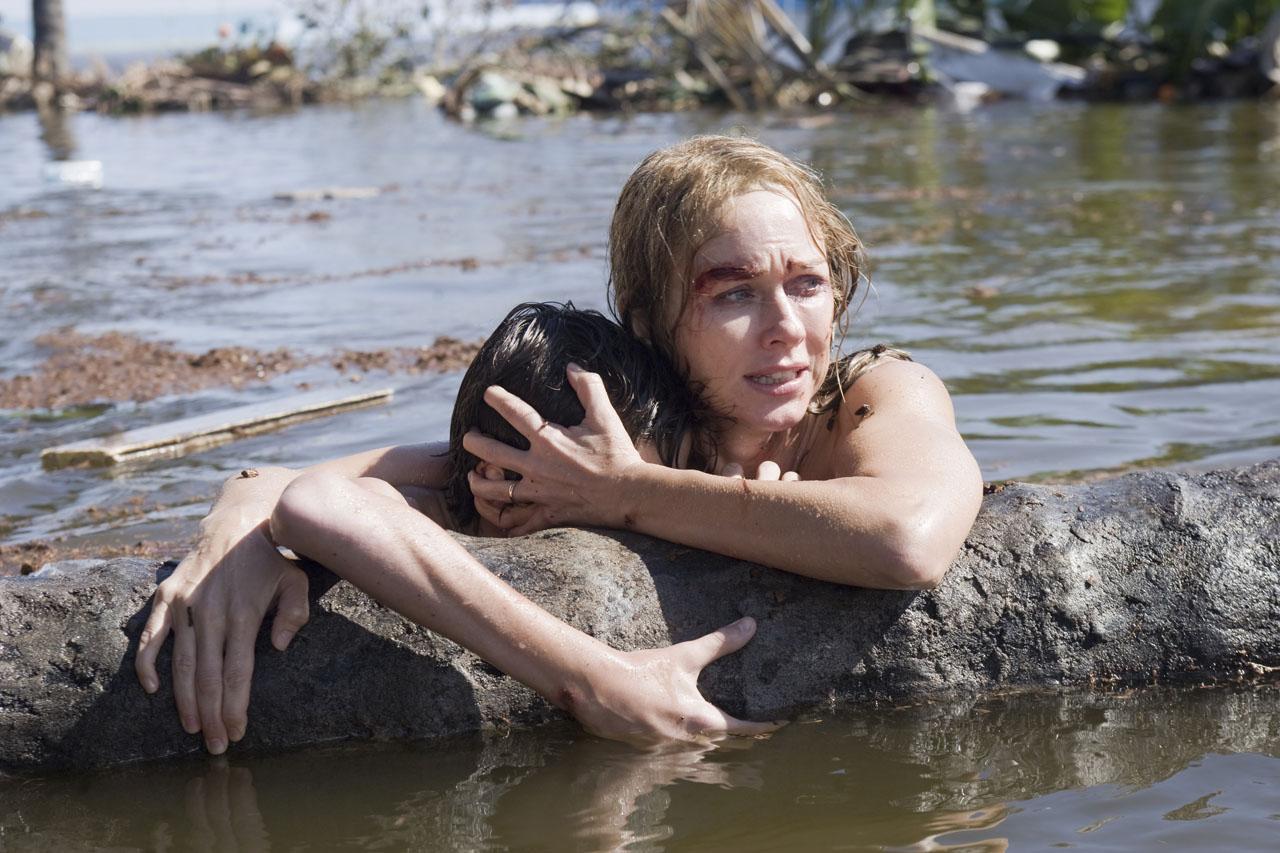
The Impossible opens to the shot of a blank screen roaring like the sea..as if gathering all its might for a kill but then you realise it is just an airplane carrying a family away to a Christmas vacation. The family of five..unpacks mundane conversations in a picture perfect tropical beach resort just a few long strides away from the sea. Life is well-thumbed and familiar like a loved book that Maria, the quietly nurturing mother, reads while watching her three boys splash around in the pool and by the beach. It is all perfect. The family meals in the lamp lit restaurant, the Christmas eve on the beach with hundreds of paper lanterns making their way into the unknown. And all the while, you hear the sea, holding its breath and sighing.
**
A little like life that we think we have figured out, tamed, controlled and sorted. And then ofcourse, the illusion breaks. In the blink of an eye. Maria is trying to chase a loose leaf from her book (a metaphor, we will understand later), her kids and husband play in the pool, a woman is slathering sunscreen on a man’s back for a day on the beach, someone is whipping up a smoothie in a blender and then something shudders, the birds get noisy and disperse and a distant roar becomes louder and louder. As everyone freezes where they are..a 30-ft high wall of water rams into the resort, knocking down trees as if they were matchsticks, carrying away people, families, life stories, shattering walls and the idea that anything at all in life can be controlled, protected,predicted.
**
In Spanish director Juan Antonio Bayona’s hands, The Impossible becomes more than just a big budget, Hollywood disaster movie, calculated to evoke shock and awe though the sense of foreboding he builds is reminiscent of a great white terror lurking by the beach in a Spielberg film we all remember. And there is Fernando Velázquez’s music that gathers symphonic terror and gentle compassion, thundering and ebbing along with the story. But once we see Maria (Naomi Watts making you forget she is Naomi Watts ) hanging on to a tree while muddy currents hurtle past her, crying out aloud in fear and disbelief , we know this is not a film made to skim over disaster after set pieces have been knocked down by tidal waves. And when in an excruciatingly detailed sequence, we watch a grievously injured Maria and her oldest son Lucas (a pitch perfect Tom Holland) trying to help each other through a wasteland, this recreation of the 2004 Indian Ocean Tsunami becomes more than just a cinematic experience. It becomes bigger than cinema.
**
The story, inspired by a real family is treated with rare delicacy and sensitivity though it spares us nothing. The struggle to stay alive embodied by Maria and Lucas through the possible loss of the rest of their family and an injury that may kill Maria, is depicted with the immediacy of a flesh wound. And then there are unbearably, unutterably tender moments like when Lucas helps his bleeding mother to climb on a tree or when the young child they have rescued strokes Maria’s pale face and her bruised arm in quiet gratitude and in wordless acceptance of the horror they are all living together. And the humanity that shines trough the devastation. The villager who drags Maria through mud to safety where she is given clean clothes to cover her body and she leans on to an old woman and cries, “Thank you…thank you.” Or when Ewan McGregor’s grieving protagonist finds a phone and sobs into it while fellow survivors watch him in wordless empathy. Or when two young children cling to each other for solace in a hill shelter and Geraldine Chaplin in a stirring cameo watches the stars with them and comforts them with a little story about the mystery of life. Or when Maria, struggling with her own pain, asks her son to help other survivors in the hospital and he manages to unite a father and a son.

As the film progresses, it effortlessly strips down life of all the paraphernalia we carry, right down to bare bones and breath when what we have or don’t does not matter but who we are does. Especially when all that we know is taken away. As we see an island cluttered with corpses, hospitals overflowing with the dead and the dying, the desperate search of loved ones for loved ones, the frightening helplessness of perhaps dying slowly in a hospital bed surrounded by strangers who don’t know your name, floors streaked with blood, orphaned children huddled in vans and being taken to shelters, people grief stricken and in shock, we realise just how little we know of an existence without the comforts of food, a home, a family to love and laugh, the feeling of safety, possessions and every thing we take for granted.
**
And how little we know also of the inexplicable mystery of death that wiped out an estimated 280,000 lives but decided to spare a few. And of life that in a stroke of miraculous generosity, returns everything that was taken away and then some more. Ensuring however that we will never forget what a privilege it is to be alive and to share moments of joy with those we love. The Impossible, incandescent with incredibly moving performances by the lead performers especially Watts and Tom Holland is a wrenching journey you will never forget. It slaps us into counting our blessings and shows us that beyond the seemingly impossible..WE still are possible. And that even in the darkest times imaginable, it is possible to show grace, to be uncompromisingly human and to be heroic beyond our own imagination.
**







